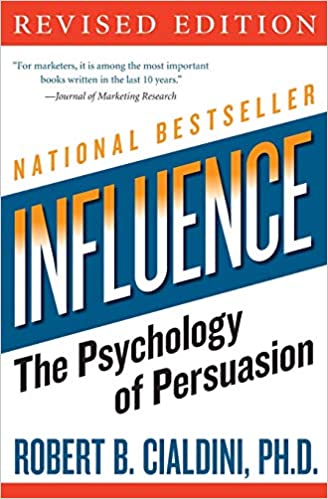Do you ever wish you could read minds? Imagine being able to understand a person’s thoughts and emotions just by observing their body language and facial expressions. It may seem like something out of a spy movie, but the power of observation is a valuable skill that can be learned and honed by anyone.
In this article, we will explore the secrets behind reading minds like a pro and how to use this skill to your advantage. Whether you’re in a business meeting, social gathering, or simply trying to improve your people skills, mastering the art of observation can give you a significant edge.
We’ll delve into the science behind body language and non-verbal cues, teach you how to recognize subtle signs, and provide practical tips on how to interpret what others are really thinking. Get ready to unlock a whole new level of communication and understanding as we uncover the power of observation.

Influence
by Robert Cialdini
⏱ 14 minutes reading time
🎧 Audio version available
The Art of Observation
Observation is more than just passively looking at someone or something – it’s an active process that involves paying attention to details, picking up on cues, and using your intuition to interpret what you see. In a world where communication is often dominated by words, the ability to read minds through observation can give you a unique advantage.
Why Observation is Important
Observation is the key to understanding others on a deeper level. It allows you to pick up on subtle cues that may go unnoticed by others, giving you valuable insights into a person’s thoughts, feelings, and intentions. Whether you’re in a business meeting, social gathering, or simply trying to improve your people skills, mastering the art of observation can help you navigate social situations with ease and make more informed decisions.
The Psychology Behind Reading Minds
To truly understand the power of observation, it’s essential to delve into the psychology behind it. Our brains are wired to pick up on non-verbal cues, such as body language and facial expressions, as a way to gather information and make sense of the world around us. By understanding the underlying psychological processes at play, you can enhance your ability to read minds and improve your overall communication skills.
Developing Your Observational Skills
Like any skill, observation can be developed and refined with practice. Start by consciously paying attention to the people and environment around you. Notice the small details – the way someone crosses their arms, the way their eyes dart around the room – and try to make connections between these observations and the person’s inner thoughts and emotions. Over time, your ability to read minds through observation will become more natural and intuitive.
Body Language and Non-Verbal Cues
Body language is a powerful form of non-verbal communication that can reveal a person’s true feelings and intentions. By understanding the meaning behind different body language cues, you can gain valuable insights into a person’s mindset. For example, crossed arms may indicate defensiveness or disinterest, while open palms may signal honesty and trustworthiness. Paying attention to these cues can help you better understand and connect with others.
Facial Expressions and Microexpressions
Facial expressions are another important aspect of non-verbal communication. Our faces can convey a wide range of emotions, from joy and surprise to anger and sadness. However, people are not always aware of the expressions they make, and that’s where microexpressions come into play. Microexpressions are fleeting facial expressions that occur within a fraction of a second, often revealing a person’s true emotions before they have a chance to conceal them. By learning to recognize and interpret these microexpressions, you can gain valuable insights into a person’s thoughts and feelings.
Detecting Deception Through Observation
Observation can also be a powerful tool for detecting deception. When someone is lying, their body language and facial expressions often reveal subtle signs of discomfort, such as fidgeting, avoiding eye contact, or inconsistencies between their words and actions. By paying close attention to these cues, you can increase your ability to spot lies and navigate situations with greater clarity and confidence.
Practicing Active Listening
Observation goes hand in hand with active listening – the art of fully engaging with others and paying attention to both their words and non-verbal cues. By combining observation with active listening, you can gain a deeper understanding of others and build stronger connections.
Practice active listening by maintaining eye contact, nodding to show understanding, and asking open-ended questions to encourage further conversation. This combination of observation and active listening will help you read minds more effectively and foster better communication.
Related: Psychological Tricks to Influence People and Make Them Say Yes
Applying Observation in Everyday Life
The power of observation extends beyond professional settings – it can also greatly impact personal relationships. By honing your observational skills, you can better understand your loved ones, anticipate their needs, and respond more effectively to their emotions. Additionally, observation can help you navigate social situations, allowing you to adapt your communication style to different individuals and situations.
The Power of Observation and its Impact on Personal and Professional Relationships
In conclusion, the power of observation is a valuable skill that can greatly enhance your personal and professional relationships. By honing your ability to read minds through observation, you can gain valuable insights into others’ thoughts, emotions, and intentions.
Whether you’re in a business meeting, social gathering, or simply trying to improve your people skills, mastering the art of observation can give you a significant edge.
So, start paying attention to the details, develop your observational skills, and unlock a whole new level of communication and understanding. The power of observation is within your reach – embrace it and watch as your relationships flourish.
What Is Snapreads?

With the Snapreads app, you get the key insights from the best nonfiction books in minutes, not hours or days. Our experts transform these books into quick, memorable, easy-to-understand insights you can read when you have the time or listen to them on the go.



